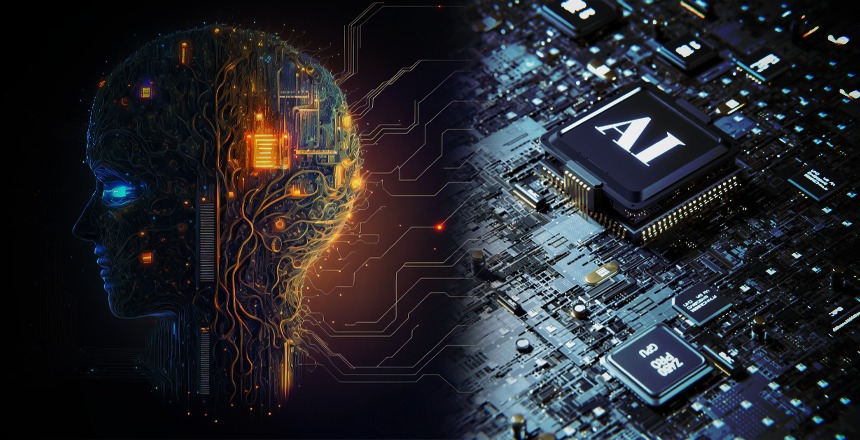Artificial Intellegence And Machine Learning

The academic concepts of artificial intelligence (AI) and machine learning (ML) have rapidly evolved into practical tools that influence how technology and business operate daily. Consequently, many courses have emerged aimed at equipping people with the right skills to excel in these modern fields.
Understanding AI and ML
Living things called humans are indeed capable of executing tasks that necessitate mental capability, such as logical thinking or comprehending what someone else has said. The term artificial intelligence denotes machines invented for the purpose of performing these jobs on behalf of their creators by imitating human behavior
ML (machine learning) is one area of artificial intelligence (AI) that concentrates on how you create algorithms that let computers learn from and make choices using data Rather than being explicitly aimed at certain tasks, ML algorithms employ mathematical formulas like regression analysis or Bayesian probability that help find the characteristics of the data, thus enhancing their efficiency as time goes by
The Importance of AI and ML Courses
The pace of technology has progressed so fast that AI and ML have become essential parts in many functions of life, such as health care, financial matters, production industries, and amusement areas
More so, the rise in the use of AI-powered solutions has resulted in a huge need for experts who are able to create these systems, bring them into action, and run them
Courses related to artificial intelligence (AI) and machine learning (ML) equip one with important skills desired in the labor industry
Subjects ranged from basics to complicated ones; therefore, they could accommodate different learners’ skill levels
Key Components of AI and ML Courses
Foundational Knowledge:
The basics of the disciplines are covered in the majority of AI and ML courses
In this context, one may find out what AI and ML are and how they originated, as well as the various application areas for both technologies Students will be exposed to a variety of AI types, including narrow AI, general AI, and super intelligent AI, as well as machine learning types like reinforcement learning, supervised machine learning, and unsupervised machine learning.
In this context, one may find out what AI and ML are and how they originated, as well as the various application areas for both technologies Students will be exposed to a variety of AI types, including narrow AI, general AI, and super intelligent AI, as well as machine learning types like reinforcement learning, supervised machine learning, and unsupervised machine learning.
Mathematics and Statistics:
A strong base in mathematics, especially in linear algebra, calculus, probability, and statistics, is essential to comprehending AI and ML algorithms Courses normally comprise sections on these subjects so that students possess the required background knowledge to understand more complicated ideas
Programming Skills:
For those engaged in artificial intelligence (AI) and machine learning (ML), knowledge of programming languages, mainly Python, is crucial
Scholars pick up the skill of writing codes that can perform data processing, algorithm implementation, and the creation of AI models
To grasp this practical experience better, many programming classes include real-life exercises
Data Handling and Processing:
AI and ML have their roots in data. Data gathering, cleaning, and preprocessing are some of the topics covered in the courses so that students can prepare for the purposes of the examination
This encompasses methods for dealing with absent entries, feature scaling, and huge data sets
Machine Learning Algorithms:
When taking classes in artificial intelligence and machine learning, a substantial amount of time is spent on the different algorithms employed in machine learning
This category encompasses linear regression, decision trees, support vector machines, and neural networks. Students gain an understanding of the working principles behind each algorithm, along with the necessary implementation skills and picking out the appropriate times to apply them.
Deep Learning:
Deep learning programs introduce students to convolutional neural networks (CNNs), recurrent neural networks (RNNs), and other models applied in diverse areas such as sound or image identification and the definition of natural languages, among others
Real-World Applications:
It is common for courses on AI and ML to provide case studies and projects that enable students to utilize their knowledge in real-life situations This type of experience gained through competitions is essential to acquiring the necessary skills to operate in the field
Ethics and Responsible AI:
Great power always comes alongside great responsibility The syllabuses usually include discussions on subjects like the ethical implications of AI, biases, and fairness, to mention but a few There is a great focus on educating learners on how to build AI systems that are capable of not just performing well but also being ethical and open at the same time.
As AI and ML professionals become increasingly in demand, there is a pressing need for their services by various entities around the globe.
AI and ML have been added to more disciplines, which has led to an increase in the number of people who are qualified in this area
The roles that individuals get prepared for through AI and ML courses include:
Data Scientist:
Predictive models are built, statistical analyses are performed, and findings are communicated to relevant parties through these techniques
Artificial intelligence (AI) and machine learning (ML) methods are employed by data scientists for the analysis of complex data sets with the aim of extracting valuable insights from them
Machine Learning Engineer:
A machine learning engineer creates and develops machine learning systems that have been built to work with data on them
Models placed in production environments will usually require such expertise, as this may require some interface between the computer systems involved. To construct as well as put into practice algorithms meant for machine learning systems is fundamentally the responsibility of a machine-learning engineer. They closely collaborate with data scientists and software developers when it comes to deploying models in actual systems
AI Research Scientist:
In the field of AI, a research scientist aims to move it forward through formulating new algorithms, models, and technologies They usually operate either in schools or in the research and development areas of companies.
AI Product Manager:
In AI product management, AI product managers are responsible for overseeing the development and implementation of AI-powered products. Technical teams and business stakeholders are the two groups this partnership links, thus making sure that AI solutions fit the business objectives.
AI Consultant:
AI consultant: The AI consultants assist organizations to identify opportunities that exploit AI and ML for solving various business challenges. They offer strategic counsel, create implementation plans and offer support in the application of these AI implementations.
Conclusion
Due to the shift in how we live and work, artificial intelligence (AI) and machine learning (ML) have become very important for people to learn. AI and ML courses offer a complete education that spans from basic ideas to cutting-edge methods, hence preparing learners for a variety of professional paths.
If you’re a pro who needs to refresh skills or just want to dive into technology as a fresh graduate, courses in artificial intelligence (AI) and machine learning (ML) will pave your way in one of the fastest growing domains. The mastery of these subjects will help you become an architect of next innovations leaving long-term footprints on earth.
- Written By - Natasha Singh









